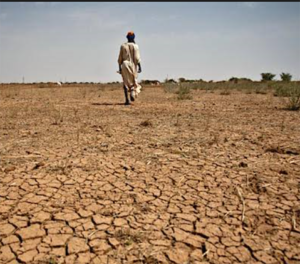Climate change means conflict and migration – UN expert
Large areas of land across Africa to the Middle East are being left unusable by climate shifts and human pressures such as deforestation, mining and farming, threatening a large increase in migration and conflict, a United Nations environmental expert has warned.
And the accelerating damage could cost the global economy a staggering $US23 trillion by 2050, according to the Executive Secretary of the UN’s Convention to Combat Desertification Ibrahim Thiaw.
 In poor communities, stressed and ailing land shatters families and causes young people to leave home, Mr Thiaw said.
In poor communities, stressed and ailing land shatters families and causes young people to leave home, Mr Thiaw said.
He said land degradation created friction and conflict over access to land and water.
And even in richer places, damaged land around the world could mean some foods and other imported products people rely on will become scarcer and migrant flows will increase, he said.
“When young people from one part of the world cannot produce enough for their families, they will have to move to another place. And we cannot stop them from migrating,” Mr Thiaw said, speaking to a conference in New Delhi.
“I don’t think the world will watch and feel they are not affected,” said the former forestry expert from Mauritania.
Efforts to cut the loss of productive land and restore damaged areas were underway, Mr Thiaw said.
Many nations are planting large numbers of trees, working to capture and store more water, protecting wetlands and shifting to crop-growing and grazing styles that better protect fragile soils, Mr Thiaw said.
Growing access to renewable energy – particularly solar and wind power – also is helping many rural areas protect land and incomes by providing clean, free energy for farm irrigation or powering food processing facilities that curb waste, he said.
“The knowledge is there, the technology is there – it can be done. But the scale at which it’s being done at the moment is not enough to change the curve,” he said.
“We are still losing a lot of land,” Mr Thiaw said.
In Mauritania, a traditional livestock-herding nation, there was no forest left, he said.
“It’s all degraded land. You have the population growing on the one hand and resources shrinking on the other,” Mr Thiaw said.
In neighbouring conflict-hit Mali, Dogon farmers and Fulani herders are fighting over resources as land suffers from growing heat and climate shifts, among other things.
“I know that area well and they do not hate each other. They are simply competing over land and water,” Mr Thiaw said.
One barrier to preventing such conflicts is that government and charitable funding to restore degraded land falls far short of what is needed, he said.
Mr Thiaw said private money was required to fill the gap.
“In Africa, that could be investment in turning land unsuitable for farming into wildlife reserves to attract tourists, or rethinking old mines as recreational lakes,” he said.
“Land that can no longer support crops might – with the advent of solar refrigeration – be used to produce organic or halal meat for international markets, supporting traditional herding cultures.
“In parts of China, degraded communal land has been leased long term to investors, who pay annual rent and offer jobs to local people at vegetable farms or other facilities they have opened after restoring the land,” Mr Thiaw said.
Finding ways to revive degraded land is crucial as climate shifts become more extreme, making it harder to grow enough food for an expanding population, he said.
In places like Africa’s Sahel region, on the southern edge of the Sahara desert, for instance, droughts are not a new phenomenon, as they used to happen seven to 10 years.
Now they are every other year.
Without swift action to keep more land viable and rehabilitate land that is no longer usable, threats ranging from hunger to forced migration and conflict could grow, Mr Thiaw said.
“Land is really the economy. Its peace and security,” he said.












